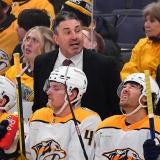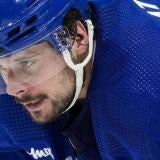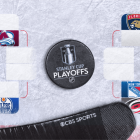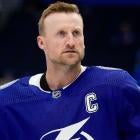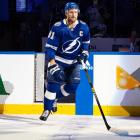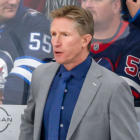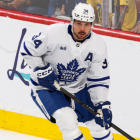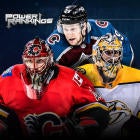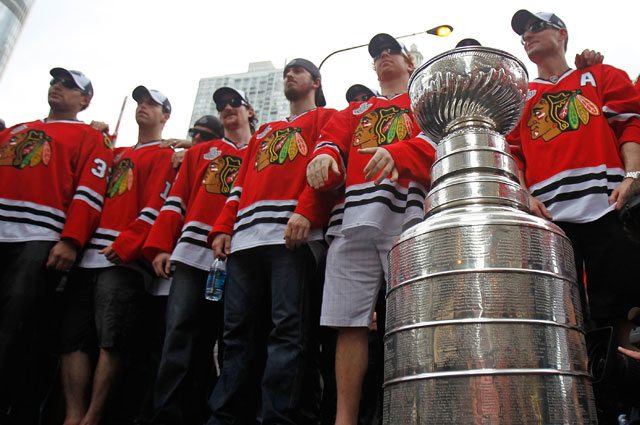 |
| The 2009-10 Chicago Blackhawks were as impressive as any Cup winner in recent memory. (Getty Images) |
If nothing else, at least hockey fans can look at the lockout that wiped out the 2004-05 season and say that it accomplished something. That something, of course, being the salary cap. Whether you agree with the idea of a cap or not it was at least more productive than the current lockout, which is simply about ... well, deciding which rich person gets the biggest piece of money.
The salary cap changed the way general managers had to construct their teams and placed a bigger premium on player development, finding value, and determing which positions were worth spending big money on.
Since there's no NHL hockey going on right now we decided to rank the Stanley Cup teams in the salary cap era.
As with all lists and rankings it's important to keep in mind that if your team is ranked near the top it means that yes, I am an apologist for them and if your team is ranked near the bottom it means that I hate them. So let's get to it ...
 1. 2009-10 Chicago Blackhawks -- The weak link on this Blackhawks team had to be in net with the duo of rookie Antti Niemi and high-priced (and disappointing) veteran Cristobal Huet. Niemi held his own in the crease, but with the overall makeup of the rest of the roster as well as their style of play, they didn't need an All-Star performance in net. To put it simply: The other team was never able to touch the puck.
1. 2009-10 Chicago Blackhawks -- The weak link on this Blackhawks team had to be in net with the duo of rookie Antti Niemi and high-priced (and disappointing) veteran Cristobal Huet. Niemi held his own in the crease, but with the overall makeup of the rest of the roster as well as their style of play, they didn't need an All-Star performance in net. To put it simply: The other team was never able to touch the puck.
This was as impressive a roster as any team has had in the salary cap era. The forwards included Jonathan Toews, Patrick Kane, Patrick Sharp, Marian Hossa, Kris Versteeg, Andrew Ladd, Dustin Byfuglien, and Troy Brouwer, while their top four on defense was made up of Norris Trophy winner Duncan Keith, his partner Brent Seabrook, and the No. 2 duo of Brian Campbell and Niklas Hjalmarsson.
Eight players scored at least 15 goals, six scored at least 20, and on an average night the Blackhawks outshot their opponents by nine shots. To put that number into perspective, no other team in the NHL that season had a shot differential of greater than plus-four. They weren't a particularly strong team on the power play, but they dominated the opposition at five-on-five play like few other teams we've seen in recent years.
Unfortunately for the Blackhawks a lot of the team's secondary depth and goaltending (Ladd, Versteeg, Byfuglien, Brouwer, Niemi) had to be broken up over subsequent seasons due to the salary cap. The team hasn't won a postseason series in the two years following their Cup win. That doesn't (and shouldn't) take away from what was a truly dominant team. 2. 2007-08 Detroit Red Wings -- The Detroit Red Wings won four Stanley Cups in the 11 years between 1996 and 2007, and this was the first one that wasn't anchored by Steve Yzerman, Sergei Fedorov, and the hockey dream team that was the Red Wings roster in the early 2000s. This team was anchored up front by Pavel Datsyuk and Conn Smythe winner Henrik Zetterberg along with a deep defense headlined by Nicklas Lidstrom and Brian Rafalski.
2. 2007-08 Detroit Red Wings -- The Detroit Red Wings won four Stanley Cups in the 11 years between 1996 and 2007, and this was the first one that wasn't anchored by Steve Yzerman, Sergei Fedorov, and the hockey dream team that was the Red Wings roster in the early 2000s. This team was anchored up front by Pavel Datsyuk and Conn Smythe winner Henrik Zetterberg along with a deep defense headlined by Nicklas Lidstrom and Brian Rafalski.
After winning 54 regular-season games the Red Wings cruised through the Western Conference playoffs and then overwhelmed a young Pittsburgh team in the Final. The Penguins roster was loaded with young talent and was aided by the trade deadline additions of Marian Hossa and Hal Gill, but the style of play under then-coach Michel Therrien played right into the Red Wings' puck-possession game, and the early parts of the series were a clinic in how to control the puck.
Pittsburgh couldn't get out of its own zone, and despite having young superstars like Sidney Crosby and Evgeni Malkin could not generate any sort of a consistent threat against the Red Wings. The goaltending duo of Chris Osgood and Dominik Hasek faced its share of criticism during the postseason, but they never really needed them to be spectacular because the Red Wings never asked them to be tested on a regular basis. 3. 2011-12 Los Angeles Kings -- I don't know that this team will ever get the credit it fully deserves (yes, I'm aware that as Cup champions the Kings will still get plenty of credit for what they did) and will instead continue to get viewed as a No. 8 seed that snuck into the playoffs and simply "got hot at the right time."
3. 2011-12 Los Angeles Kings -- I don't know that this team will ever get the credit it fully deserves (yes, I'm aware that as Cup champions the Kings will still get plenty of credit for what they did) and will instead continue to get viewed as a No. 8 seed that snuck into the playoffs and simply "got hot at the right time."
As I argued shortly after the Stanley Cup Final ended, this was not your typical No. 8 seed or a team that simply got hot; this was a great team that dismantled the rest of the league for the better of six months.
For one, their roster was loaded with All-Star level talent from Anze Kopitar and Dustin Brown, to Mike Richards and Jeff Carter, to Drew Doughty and Jonathan Quick. By the end of the season this team was a juggernaut whose postseason position was due in large part to a slow start for the first month-and-a-half of the season that was mainly caused by an offense that was getting crushed by percentages (for the first month of the season their team shooting percentage was somewhere around four percent, an unspeakably low number that would never last).
The defense and goaltending was there from the start, and they consistently owned the puck even during their early-season struggles. It was only a matter of time until guys like Kopitar and Brown started to find the back of the net.
Things took off for the Kings when Darryl Sutter replaced Terry Murray and Carter was acquired from the Columbus Blue Jackets in exchange for defenseman Jack Johnson (perhaps the most replaceable player on their blue line at the time). Their playoff run was one of the most dominant that we've ever seen as they opened every series with a 3-0 lead, losing just four games the entire postseason.
It was one of the fastest paths to the Stanley Cup in recent memory.  4. 2008-09 Pittsburgh Penguins -- Two things that often get overlooked about this team: On paper the Penguins were not as talented as the previous year's team that lost to Detroit in the final. While goaltender Marc-Andre Fleury gets a lot of the credit for backstopping them to the title, with special emphasis placed on his buzzer-beating Game 7 stop against Nicklas Lidstrom to secure the title, he was actually a superior player in the postseason the year before.
4. 2008-09 Pittsburgh Penguins -- Two things that often get overlooked about this team: On paper the Penguins were not as talented as the previous year's team that lost to Detroit in the final. While goaltender Marc-Andre Fleury gets a lot of the credit for backstopping them to the title, with special emphasis placed on his buzzer-beating Game 7 stop against Nicklas Lidstrom to secure the title, he was actually a superior player in the postseason the year before.
Even though young superstars like Sidney Crosby, Evgeni Malkin, and Jordan Staal were back with yet another year of experience, a lot of their secondary depth up front was lost when Marian Hossa and Ryan Malone left via free agency and were replaced by Ruslan Fedetenko and Miroslav Satan (and later Chris Kunitz and Bill Guerin via trade).
But while the talent level may not have been quite the same in certain areas, coach Dan Bylsma seemed to utilize his team's offensive talent way more (and better) than Michel Therrien ever could. Under Therrien the Penguins were a more passive, defensive-minded team, and what they learned during his watch certainly benefited them from a defensive standpoint against Detroit. Still, it was Bylsma's ability to open them up offensively and allow them to attack Detroit in a way they couldn't the year before enabled them to claim their third Stanley Cup in franchise history.
Along the way they had to overcome a pair of two 0-2 deficits (the Eastern Conference Semifinal against Washington and the Stanley Cup Final against Detroit) and win in seven games. The Penguins had a brutal start to the season but once Bylsma took over in February and general manager Ray Shero worked his deadline magic they were nearly unbeatable the rest of the way, posting a 34-11-4 record (including playoffs). That's a 120-point pace over an 82-game regular season.
 5. 2006-07 Anaheim Ducks -- An impressive collection of future Hall of Famers in Teemu Selanne, Scott Niedermayer, and Chris Pronger, and young up-and-coming players like Ryan Getzlaf, Corey Perry, and Dustin Penner. They needed just one Game 6 the entire postseason run (the Western Conference Final against the Detroit Red Wings). While they had All-Star talent at both the forward and defense spots they also had one of the top shutdown lines in the NHL that season with Travis Moen, Samuel Pahlsson, and Rob Niedermayer going up against every team's top line all season. That line was so productive together that coach Randy Carlyle kept them together more than just about any other trio on the team.
5. 2006-07 Anaheim Ducks -- An impressive collection of future Hall of Famers in Teemu Selanne, Scott Niedermayer, and Chris Pronger, and young up-and-coming players like Ryan Getzlaf, Corey Perry, and Dustin Penner. They needed just one Game 6 the entire postseason run (the Western Conference Final against the Detroit Red Wings). While they had All-Star talent at both the forward and defense spots they also had one of the top shutdown lines in the NHL that season with Travis Moen, Samuel Pahlsson, and Rob Niedermayer going up against every team's top line all season. That line was so productive together that coach Randy Carlyle kept them together more than just about any other trio on the team.  6. 2010-11 Boston Bruins -- Even with the Stanley Cup to its credit I'm not convinced this was the best Bruins team in the Claude Julien era. The 2008-09 team won 53 games before being upset early in the playoffs, and even last year's team won more games and at times seemed to be even more unstoppable than the Cup-winning squad of 2011. Even with Zdeno Chara, one of the best players in the league, I still think this team had some weaknesses on the blue line, but a lot of that was masked by the outstanding play of goaltenders Tim Thomas and Tuukka Rask. Thomas in particular was outstanding with a .938 save percentage in the regular season and even better in the playoffs at .940.
6. 2010-11 Boston Bruins -- Even with the Stanley Cup to its credit I'm not convinced this was the best Bruins team in the Claude Julien era. The 2008-09 team won 53 games before being upset early in the playoffs, and even last year's team won more games and at times seemed to be even more unstoppable than the Cup-winning squad of 2011. Even with Zdeno Chara, one of the best players in the league, I still think this team had some weaknesses on the blue line, but a lot of that was masked by the outstanding play of goaltenders Tim Thomas and Tuukka Rask. Thomas in particular was outstanding with a .938 save percentage in the regular season and even better in the playoffs at .940.
The Bruins needed to survive three Game 7s on their way to the franchise's first Stanley Cup since 1971-72, including the winner-take-all game in the Final against the Vancouver Canucks and an overtime contest in the opening round against Montreal.

7. Carolina Hurricanes -- The Carolina Hurricanes have qualified for the playoffs just twice in the past seven years. In 2008-09 they went all the way to the Eastern Conference Final before being swept by the eventual Cup champion Pittsburgh Penguins. Their other playoff appearance was in the first year out of the 2004-05 lockout and resulted in the organiztions first (and only) Stanley Cup championship. In the year before the lockout the Hurricanes won just 28 games and finished in third place in the Southeast Division, so it was a pretty significant jump in just one season thanks in large part to a lot of players having career years at the same time, and a rookie goalie (Cam Ward) catching fire in the postseason.
Eric Staal had a breakout year (and it's still his best season offensively) after spending the lockout playing in the American Hockey League. They had their first full of year of Justin Williams after acquiring him midway through the '03-04 campaign and he responded with his best season in the NHL scoring 31 goals to go with 45 assists. Veteran Cory Stillman was a part of his second consecutive cup team and also had his best year in the NHL at the age of 32.
Entering the playoffs Ward had appeared in just 28 regular season games (Martin Gerber started the majority of the games in net) and stole the show in the playoffs winning the Conn Smythe Trophy.
For more hockey news, rumors and analysis, follow @EyeOnHockey and @agretz on Twitter and like us on Facebook.







